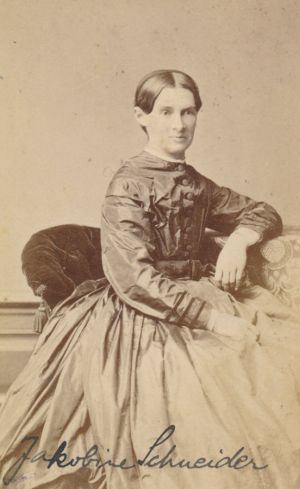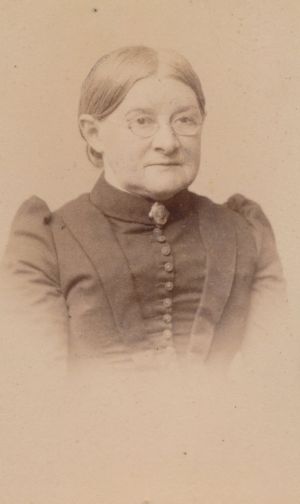Jacobine Schneider (Da VII 3)
Jacobine Louise Caroline Wilhelmine Antoinette Schneider, née Eckart, (Da VII 3), (*January 1, 1829, in Emskirchen, Germany, †January 11, 1900, in Munich, Germany), housemother; married Johann Georg Schneider on May 29, 1859 in Castell, Germany
Source text concerning Jacobine Schneider
Short biography about Jacobine, written down by her daughter Babette Schneider, from the Chronicle of the Eckart Family (F-S346), compiled by Otto Eckart in 1927, part handwritten and part typed:
My dear mother, Jakobine Schneider, née Eckart, was born on January 1, 1829, in Emskirchen as the third child of David Eckart and his wife Jeanette.
She spent her childhood and schooldays at her parents’ house, surrounded by her numerous siblings whom she and her elder sister Jette took care of. In doing so, she became a support for her very busy mother. She also spent many pleasant hours in the house of her father’s wards, clergyman Oertel’s deaf-mute orphans, who particularly Hanne had grown fond of. After finishing Sunday school, she learned to cook in Nuremberg and then helped her mother in the household again.
In 1850, the 21-year-old started work as housemother in the orphanage Karolinenfeld, near Greiz in the former Principality of Reuss. Here, for ten years she carried out her duties to the utmost satisfaction of Princess Karoline, the foundress of the institution. This is where she became acquainted with her future husband, Johann Georg Schneider, who, as housefather, oversaw the boys’ department of the same institution for several years. [At this point, one page is missing in the pdf file or the document.]
… to take us to acquaintances in the Steigerwald region: One heard the roar of the cannons from morning to night and lived in fear that the detested Prussians would appear. Finally, Bavarian soldiers were accommodated there under whose protection we felt safe.
Following the christening of little Susanne, grandmother moved there with Aunt Tina and the grandchildren; aunt stayed there until her wedding; grandmother until her death. She always spent the summer with one of her children. I was also allowed to come to Emskirchen on account of school and spent two happy years there.
In the year 1866, my parents took over a leasehold in Berchtshofen, near Windsheim, as Uncle Blaufuss wanted to personally take care of the institution in Mutschenhof. Upon the advice of Uncle Johannes, the parents moved to Munich, at that time notorious and dreaded as a typhoid fever hotspot, in the spring of 1868. For this reason, mother categorically refused to move to the inner city. Therefore, Uncle Johannes found a spacious dwelling with bright, high-ceilinged rooms and a big garden for them on the street, which was formerly called Sternwartstrasse, in Bogenhausen, then a village near Munich. This house, which still existed in 1901, has now been replaced by Villa Ludovici. Mother quickly acclimatized to her new home as she was able to cultivate the garden and keep chickens like she did before. Father, however, started work as a supervisor in the mineral water factory owned by Uncle Fritz’ longtime friend Friedrich Seyboth, who later became Kommerzienrat (an honorary title for distinguished businessmen).
In autumn 1868, I also came to Munich and attended the, in those days, only Protestant school, located at the Glockenbach brook (now the street Georg Wilhelmsstrasse). During the week, I stayed with Uncle Johannes and Aunt Susanne at the square Salvatorplatz; on Saturdays, I was allowed to go home with father. During Advent, I was ill when I came to Bogenhausen and, shortly afterwards, we four children and mother were ill with typhoid fever. The street in front of our house was closed by the police due to a typhoid fever epidemic and the case, which attracted a lot of attention, appeared in the newspapers: thanks to good care, our robust constitution and the airy dwelling, we all recovered; only mother’s hair, which used to be blond, turned black after the recovery.
In autumn 1869, my parents moved to the city, and we lived at the square Gärtnerplatz N 1, and later in the street Rumfordstrasse 39. Cholera passed us by, but in 1872, my three siblings fell ill with scarlet fever, which claimed the life of my little siter, who was the youngest, on March 17. My sister Minette suffered greatly from the resulting illnesses (dropsy, etc.), but recovered, even though the doctors had given up hope. Could it have been the remedies of the peasant woman healer, the last person that my father went to, that helped? Nobody knows.
We children were brought up with love but also with the necessary discipline and had to attend good schools. Father and mother often denied themselves basic necessities in order to scrape together the school fees and procure books. After elementary school, I attended the girls’ school and then the newly founded teacher training school and the teacher training college; my sister learned plain sewing at the women’s school for practical work training; while my brother, after attending secondary school, started an apprenticeship with his godfather Karl Wich in Nuremberg to become a goldsmith.
In the early 1880s, father started to suffer from poor health and, on November 9, 1885, in his 57th year, succumbed to consumption which he had contracted in his profession. My good mother, who had provided superhuman care to the beloved patient, as well as looking after the household, nearly collapsed after the death of her husband. Nevertheless, she did not allow my sister to stay at home and support her. My sister was not permitted to refuse a position offered to her by the Karl Hierneis family and she stayed with this family up to her last illness and ensuing death (1894).
With my brother still in military service, I was from then on, my mother’s only support, as substitute teacher with a monthly salary of 65 marks and strongly endeavored to brighten up her remaining years. I had taken the exam for employment with the government during my father’s last days, and thus had good prospects for permanent employment in Munich. Due to the poor payment of the female teachers (my salary never lasted more than the first week of the month), there were still times when I was only able to get by with the help of Uncle Johannes and Aunt Susanne. However, with private lessons, Sunday school, corrections, and paperwork etc. I gradually earned so much that I was able to repay the fees for schools I had attended and to make my mother’s life easier. We employed a housemaid, and, during the day, mother was sometimes able to indulge in her main pleasure, to read a good book. On Sundays, we went to the street Brudermühlstrasse to spend the afternoon and evening at Uncle Fritz’ house. There, the siblings – Uncle Fritz, Aunt Jette, my mother and Uncle Johannes – sat together and reminisced about old times.
Die schwere Pflege meiner Schwester, die während ihres 9 monatelangen Krankenlagers bei uns war, nahm Mutter recht mit u der Tod ihres Kindes war ein schwerer Schlag für sie, den sie aber still u gottergeben trug, wie Mutter überhaupt lauter Gefühlsäußerungen, sei es in Freud oder Leid, nicht fähig war. Um so tiefer u schwerer empfand sie alles. An ihren Kindern, wie an ihren Geschwistern hing sie mit zärtlicher Liebe. Als Onkel Johannes Krankheit anfing, bedenklich zu werden, sorgte sie sich Tag und Nacht um ihn u besuchte ihn so oft es ging, auch draußen in Pullach.
Mit den Jahren hatte sich bei Mutter Herzschwäche eingestellt, die im Herbst 99 einen hohen Grad erreichte, so daß die Leidende zeitweise bettlägrig war. Kaum außer Gefahr traf sie Onkels Tod am 26. Nov. mit doppelter Schwere. Trotz eigener Schwäche ließ sie sich nicht abhalten, bei der Einsegnung des geliebten Bruders zugegen zu sein. Es war ihr letzter Ausgang. Bald darauf legte sie sich, um nicht mehr zu genesesen. Am 11. Jan 1900, kurz nach ihrem 71. Geburstag schloß sie die Augen für immer.
Von Natur zierlich u in jüngeren Jahren mager mit schmalem Gesicht, das von dichten, anfangs blonden, später schwarzen Haaren umrahmt war, zeigte sie doch eine seltene Leistungsfähigkeit u Ausdauer. Ihre stille, schüchterne Natur machte wenig aus sich, ging nicht leicht aus sich heraus. Aber ihre Herzensgüte u ihre Liebe zu den Ihren zeigte sich bei jeder Gelegenheit. Stets war sie bereit, bei den Kindern von Onkel Johannes Nachwachen zu übernehmen u den nächsten Morgen wieder früh ihr Tagewerk beginnen musste. Wo sie helfen konnte, war ihr kein Opfer zu groß. Darum war sie auch überall beliebt u ihr Andenken lebt in meinem Herzen, wie bei allen die sie kannten, unverändert weiter.
Geschrieben zum Andenken an meine lieben Verstorbenen von Babette Schneider. 25.II.1923

